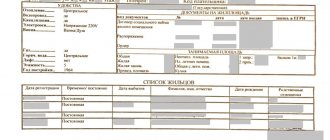Police, Ministry of Emergency Situations, collectors, firefighters, military commissars, workers of public utilities and management companies: who must be allowed into the apartment and who should not? We understand the exceptions to the general rule on the inviolability of home and private property.
Police, Ministry of Emergency Situations, Housing Office, emergency services, collectors, National Guard, bailiffs - who has the unconditional right to enter the home. The right of citizens to the inviolability of their home is guaranteed by the Constitution of the Russian Federation, albeit with some reservations. The inviolability of an individual’s home may be limited by law in exceptional situations when public interests require it. This can be done by the court or those government bodies that are given such a right by law. There is a whole circle of people whom everyone is obliged to let into the apartment upon request. And for refusal to open the door for them or provide free access to housing, liability is provided. Therefore, everyone should know who can be denied a home and who cannot. And what to say and do if such unexpected guests come.
Open up, police!
According to the police law, police officers have the right of access to citizens' residential premises. But only if they have a warrant, if they have reasonable grounds to believe that a criminal is hiding or a crime is being committed there, or if they believe that someone's life is in danger behind closed doors. If in the first case everything is clear - there is a corresponding document, then in the other two you can only rely on the fact that the policeman’s suspicions will turn out to be unfounded and the police will leave the apartment, perhaps even with an apology. By the way, the security forces do not choose how to enter a home in such a situation; they can knock down the door or break a window. Obtaining compensation for damaged property can be difficult and time-consuming, even if the police were wrong. Therefore, if the police ring at the door, it is better to answer immediately. Employees of the FSB of Russia and employees of the Russian Guard have similar powers.
Penetration of police officers into residential premises is permitted in cases provided for by the legislation of the Russian Federation, namely:
- if it is necessary to carry out an inspection of a home when a police officer presents a court decision in the absence of consent to inspect the home of the persons living in it, as well as a search and seizure of a home when a police officer presents a court decision. Moreover, in exceptional cases, when the inspection of the home, search and seizure of the home cannot be delayed, these investigative actions can be carried out on the basis of a decision of the investigator or inquiry officer without obtaining a court decision. In this case, the investigator or inquiry officer, no later than 3 days from the start of the investigative action, notifies the judge and the prosecutor about the investigative action. Attached to the notification are copies of the resolution to carry out the investigative action and the protocol of the investigative action to verify the legality of the decision to carry out the investigative action. Having received this notification, the judge checks the legality of the investigative action taken and makes a decision on its legality or illegality;
- to save the lives of citizens and (or) their property, ensure the safety of citizens or public safety during mass riots and emergency situations (clause 1, part 3, article 15 of the Law “On the Police”);
- to detain persons suspected of committing a crime and who are in residential premises (clause 2, part 3, article 15 of the Law “On the Police”);
- to suppress a crime committed in a residential area (clause 3, part 3, article 15 of the Law “On Police”),
- to establish the circumstances of an accident in a residential area (clause 4, part 3, article 15 of the Law “On the Police”).
A police officer has the right to enter a residential premises by breaking open doors or locking devices.
In this case, the police officer who enters (penetrates) the residential premises is obliged (Part 5, Article 15 of the Federal Law “On the Police”):
- before entering a residential premises, notify the citizens there about the reasons for entry, except in cases where delay creates an immediate threat to the life and health of citizens and police officers or may entail other grave consequences;
- when entering a residential premises, against the will of the citizens there, use safe methods and means, respect the honor, dignity, life and health of citizens, and prevent unnecessary damage to their property;
- not to disclose facts of the private life of citizens living there that became known to him in connection with entry (penetration) into a residential premises;
- inform your immediate superior and submit a report within 24 hours about the fact of entry (penetration) into the residential premises.
Firefighters or emergency services personnel
As a rule, rescue workers want to get into someone’s house or apartment for a reason, but to eliminate an emergency. Therefore, they have a legally enshrined right to enter any open or closed premises. It is better not to interfere with this, because in such cases we are talking about saving lives and property.
At the same time, if there is no fire in sight, and a stranger introduces himself as a firefighter and asks to be allowed into the apartment, this should not be done. Real firefighters do not enter residents' apartments for inspections. They check compliance with fire safety rules in common areas: in hallways, basements, attics - together with specialists from management companies. Employees of the Ministry of Emergency Situations can only work as part of a commission that inspects an apartment when, for example, it is excessively cluttered.
Bailiffs
Employees of the FSSP of Russia, also known as bailiffs, also have the right to access residential premises, but only if it is occupied by a debtor in open enforcement proceedings or has permission from a senior bailiff. A visit by bailiffs is not possible at night, and they must open closed premises only in the presence of the police and with the appropriate permits and documents. By the way, a bill from the Russian Ministry of Justice is currently under consideration, which involves granting the right to bailiffs to visit citizens’ apartments to identify illegal redevelopment. It has not yet been approved, but in the future FSSP employees may have such powers.
Bailiffs have the right to visit you only on weekdays from 6 a.m. to 10 p.m. They can disturb a person at night and on weekends only in exceptional and urgent cases. For example, if we are talking about the removal of a child or a threat to health and life. Of course, debt collection does not apply to such cases.
As a rule, performers choose evening hours for home visits. In this case, the likelihood of finding the debtor or his relatives at home is higher.
First of all, you need to make sure that the bailiffs are who they say they are. The performer must wear an official uniform. He is obliged to present his identification, introduce himself, inform about the purpose of his visit and show the resolution to initiate enforcement proceedings.
After the bailiff has entered the apartment, he begins to inventory the property. The performer must do this in the presence of two witnesses.
Important! Bailiffs do not have the right to search housing. They conduct an inspection to assess the debtor’s property status and draw up an inventory of what can be recovered. This means that performers are not allowed to break into floors, open drawers, nightstands, cabinets, or rummage through your belongings. They can only arrest what is in their field of vision. However, this does not mean that the bailiffs will describe everything they see and leave you with bare walls.
There is a list of property that they do not have the right to deprive:
- Items of ordinary home furnishings, clothing, shoes and other things used by the debtor in everyday life. The law does not specifically indicate what applies to such items, so much will depend on the bailiff. However, the performers will not accurately describe the minimum furniture required for living (beds, tables, chairs). But a sofa on which no one sleeps, armchairs and carpets may well be seized.
- Household appliances are the first thing bailiffs pay attention to. They will leave the stove and refrigerator. However, the microwave and washing machine are at risk. The bailiffs will describe televisions and laptops first.
- Property necessary for the debtor's professional activities. The sewing machine will not be taken away from the seamstress; the musician will be left with his instrument. If you prove that you work on the computer, then it will remain with you. However, even the profession of the debtor will not play a role if such property costs more than 100 minimum wages. Moreover, there is a rather tricky thing with the minimum wage: at the time of writing this article, the minimum wage = 12,130 rubles according to Article 1 of the law “On the Minimum Wage”. But when it comes to the debtor’s property, it is believed that the minimum wage is only 100 rubles. This is what Article 5 of the same law established. Therefore, if a sewing machine or computer costs more than 10 thousand rubles, the bailiffs will confiscate them, and the fact that the machine and computer are needed for work will not save you.
- Seeds for sowing, livestock and poultry. Of course, we are talking about animals bred not for sale, but for themselves.
- Food and money for a total amount not less than the subsistence level of the debtor and his dependents.
- Fuel for cooking and heating (gas cylinders, coal, firewood).
- The debtor's property that he needs due to his disability. That is, the bailiffs will not seize even the most expensive wheelchair.
- Prizes, medals, cups - any awards are inviolable for bailiffs.
What does the law say?
In certain circumstances, the legislation of the Russian Federation allows entry into a home both against the will of the owner and in his absence. In order to answer the above questions, you need to understand the situation.
Article 25 of the Constitution of the Russian Federation guarantees: “The housing of citizens is inviolable. No one has the right to enter private houses against the will of the persons living in them, except in cases established by law or on the basis of a court decision.”
It is important to know that the terms “dwelling” and “dwelling” mean any premises suitable for human habitation. This definition includes an apartment, a dorm room, a private house, and even a hotel room.
So who has the right to enter your home without your consent or a warrant? Probably the police officers immediately come to the mind of the average person. And, indeed, this is so.
Military registration and enlistment office
What is allowed to the military registration and enlistment office?
The military commissariat has a limited list of powers: it can send a summons to a conscript stating that he must appear for military registration, but he has no right to bring him in by force.
Is it possible not to open the door to the military commissar?
Can. Among the duties of someone who is subject to military registration, there is no obligation to allow guests into the house without an invitation. Such a citizen must himself appear when called, register or withdraw from it, report to the military registration and enlistment office about various changes in life and carefully keep his military ID - this is the main list of responsibilities.
But we must remember that evading military service can become a crime, and then the police will come to you and you will have to let them in, since in this case we are talking about stopping a crime.
Policemen
Article 15 of the Federal Law dated 02/07/2011 No. 3-FZ (as amended on 08/03/2018) “On the Police” reads:
The police protect everyone's right to the inviolability of their home. Police officers do not have the right to enter residential premises against the will of the citizens living there, except in cases and in the manner established by federal constitutional laws, this Federal Law and other federal laws. Penetration of police officers into residential premises, other premises and land plots belonging to citizens, into premises, land plots and territories occupied by organizations (except for premises, land plots and territories of diplomatic missions and consular offices of foreign states, representative offices of international organizations) , is allowed in cases provided for by the legislation of the Russian Federation, as well as:
1) to save the lives of citizens and (or) their property, ensure the safety of citizens or public safety during mass riots and emergency situations; 2) to detain persons suspected of committing a crime; 3) to suppress a crime; 4) to establish the circumstances of the accident.
When entering residential premises, other premises and land plots belonging to citizens, premises, land plots and territories occupied by organizations, in the cases provided for in Part 3 of this article, a police officer has the right, if necessary, to break into (destroy) locking devices , elements and structures that prevent entry into the specified premises and onto the specified land plots and territories, and inspection of the objects and vehicles located there.
But, at the same time, according to this article of the law, a police officer entering (penetrating) a residential premises is obliged to:
1) before entering a residential premises, notify the citizens there about the reasons for entry, except in cases where delay creates an immediate threat to the life and health of citizens and police officers or may entail other grave consequences; 2) when entering a residential premises, against the will of the citizens there, use safe methods and means, respect the honor, dignity, life and health of citizens, and prevent unnecessary damage to their property; 3) not to disclose facts of the private life of citizens living there that became known to him in connection with entry (penetration) into a residential premises; 4) inform your immediate superior and submit a report within 24 hours about the fact of entry (penetration) into the residential premises.
The owner of this premises and (or) citizens living there, if such penetration was carried out in their absence, are informed about each case of a police officer’s entry into a residential premises as soon as possible, but no later than 24 hours from the moment of entry.
The prosecutor is notified in writing of each case of a police officer entering a residential premises against the will of the citizens there within 24 hours.
The police take measures to prevent unauthorized persons from accessing residential premises, other premises and land plots belonging to citizens, premises, land plots and territories occupied by organizations, and to protect the property located there if the entry was accompanied by actions provided for in Part 4 of this article.
If a law enforcement officer did not fulfill his duties and visited you without reason, and even became rude, then you can complain to the prosecutor’s office and file a complaint with the court about the action or inaction in the manner prescribed by the CAS RF.
Where to complain about the local police officer?
If a local police officer does not comply with the law, he must be complained to the head of the local police department. Initially, it is worth trying to resolve the conflict at the departmental level. If management does not respond to citizens’ appeals or defends the violator, there are two authorities where you can write a sample complaint against a local police officer:
- Prosecutor's office. This structure performs a supervisory function over compliance with the law by officials. An investigation will be carried out upon the complaint, and the perpetrators will be brought to disciplinary or administrative liability.
- Judicial authorities. If the actions/inaction of the district police officer led to material losses or moral damage, the prosecutor's office will not help; you need to file a statement of claim in court.
This is also important to know:
How to correctly write a statement to the police about a threat to life and health
Download: Sample complaint against a local police officer
Bailiff
Who else has the right to enter an apartment without the owner’s consent? Of course these are bailiffs.
By law, they have the right to enter a private home in order to seize property by court decision, but they have the following restrictions:
- firstly, they are obliged to notify the debtor in advance of their arrival;
- secondly, they do not have the right to seize household items and property that brings the owner the main income, for example, a computer, a sewing or knitting machine, etc.
If the bailiff deprived you of a computer, and you work on it, or a sewing machine, and you sew at home, then you have the right to file a complaint with the court within ten days in accordance with the requirements of the CAS RF.
You also need to know that, according to Art. 67 of the Federal Law of 02.10.2007 No. 229-FZ (as amended on 03.08.2018) “On Enforcement Proceedings” (as amended and additionally, entered into force on 03.09.2018), the bailiff has the right, at the request of the claimant or on one’s own initiative, issue a resolution on a temporary restriction on the debtor’s departure from the Russian Federation if the debtor-citizen or the debtor who is an individual entrepreneur fails to fulfill the following requirements within the period established for voluntary execution without good reason, contained in an executive document issued by a court or being a judicial act:
1) on the collection of alimony, compensation for harm caused to health, compensation for harm in connection with the death of the breadwinner, property damage and (or) moral harm caused by a crime, if the amount of debt under such a writ of execution exceeds 10,000 rubles; 2) non-property nature; 3) other requirements, if the amount of debt under the executive document (executive documents) is 30,000 rubles or more.
In case of failure by a debtor-citizen or a debtor who is an individual entrepreneur, after two months from the date of expiration of the period for voluntary fulfillment of the requirements specified in paragraph 3 of part 1 of Article 87 No. 229-FZ, the bailiff has the right, at the request of the recoverer or on his own initiative issue a resolution on a temporary restriction on the debtor’s departure from the Russian Federation if the amount of debt under the executive document (executive documents) exceeds 10,000 rubles.
If the executive document is not a judicial act or was not issued on the basis of a judicial act, then the bailiff or the recoverer participating in the relevant enforcement proceedings has the right to apply to the court with an application to establish for the debtor a temporary restriction on leaving the Russian Federation in compliance with the rules, established by parts 1 and 2 of Article 87 No. 229-FZ.
On the basis of a judicial act that has entered into legal force, establishing a temporary restriction for the debtor to leave the Russian Federation, the bailiff, no later than the day following the day of receipt of the corresponding judicial act, issues, in the manner prescribed by Article 87 No. 229-FZ, a resolution on temporary restrictions on the debtor's departure from the Russian Federation.
When issuing a resolution on a temporary restriction on the debtor's departure from the Russian Federation during enforcement proceedings on a writ of execution for the collection of funds, the bailiff of a structural unit of the territorial body of the Federal Bailiff Service instructs the bailiff of the structural unit of the Federal Bailiff Service to remove this restriction when availability of information on payment of debt under a writ of execution in the State Information System on state and municipal payments.
The resolution on a temporary restriction on the debtor’s departure from the Russian Federation is approved by the senior bailiff or his deputy. A copy of the resolution specified in Part 4 of Article 87 No. 229-FZ, in the form of an electronic document signed with an enhanced qualified electronic signature of the bailiff who issued this resolution, is immediately sent to the bailiff of the structural unit of the Federal Bailiff Service.
The bailiff who issued a decision on a temporary restriction on the debtor’s departure from the Russian Federation, no later than the day following the day of fulfillment of the requirements of the writ of execution, except for the case provided for in Part 8 of Article 87 No. 229-FZ, or the day on which other grounds for lifting this restriction, issues a resolution to lift the temporary restriction on the debtor’s departure from the Russian Federation.
The bailiff of a structural unit of the Federal Bailiff Service, no later than the day following the day of placement in the State Information System on state and municipal payments of information on the payment of debt under the writ of execution, issues in the form of an electronic document signed with an enhanced qualified electronic signature of this bailiff - executor, a resolution on lifting the temporary restriction on the debtor’s departure from the Russian Federation, a copy of which is immediately sent to the bailiff who issued the resolution on the temporary restriction on the debtor’s departure from the Russian Federation.
The exchange of information on the application and lifting of temporary restrictions on the debtor’s departure from the Russian Federation between the bailiff of a structural unit of the territorial body of the Federal Bailiff Service, the bailiff of the structural unit of the Federal Bailiff Service and the federal executive body in charge of security issues is carried out in electronically in the manner and within the time limits established by the federal executive body exercising the functions of legal regulation in the field of justice, in agreement with the federal executive body in charge of security issues.
For the purpose of exchanging this information, the state system of migration and registration records, as well as the production, execution and control of the circulation of identity documents, and a unified system of interdepartmental electronic interaction can be used. Copies of decisions on a temporary restriction on the debtor’s departure from the Russian Federation, on the lifting of this restriction, are sent by the bailiff to the debtor no later than the day following the day of their issuance.
Powers of the local police officer
What are the responsibilities of a local police commissioner in 2019 ? The most common reason for the appearance of a local police officer on the doorstep of a house is a preventive tour of a residential area, which was approved by Order of the Ministry of Internal Affairs of Russia dated December 31, 2012 No. 1166 “On the organization of the activities of local police officers” (hereinafter referred to as Order No. 1166) . In accordance with paragraph 41 of Order No. 1166, the district police officer is obliged to systematically inspect the entrusted territory, including houses, and get to know the residents. When conducting a patrol, the local police officer must be dressed in official uniform. It is prohibited to wear civilian clothes.
Check with the local police officer what punishment is provided for beating if your neighbors threaten you.
In addition, when visiting an apartment or private house, the local police officer is obliged to:
- state your name and position, and, at the request of the tenant, present your official identification;
- inform about the purpose of your visit and, if necessary, provide contact coordinates with him - office or mobile phone number, address of the local police station.
Important
When visiting an apartment during a preventive round, the local police officer does not have the right to enter the home without the permission of its owners.
Employees of housing and communal services and other economic services
In addition, you have the right to be visited by representatives of organizations that ensure the operation of communications at home (for example, to inspect and monitor the condition of gas pipes and valves), or employees of competent organizations to check the readings of indoor metering devices (which is especially important for apartment owners who have installed individual cold and hot water).
In this case, the time of the visit is usually agreed upon in advance, most often by means of an announcement or sending a corresponding notice by mail.
You also need to know and remember that the need to invade a home may arise due to objective circumstances:
- fire,
- gas leak,
- water pipe damage,
- arrest of a criminal
- providing medical assistance to victims, etc.
Such actions, although formally they violate the inviolability of the home, are nevertheless legal, since they are determined by extreme necessity.











